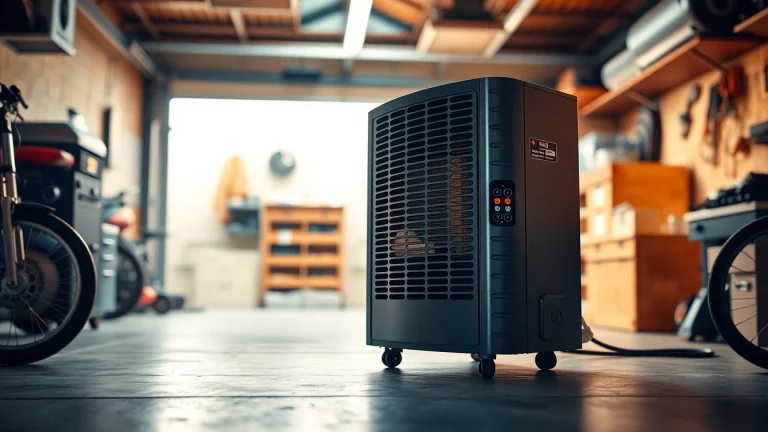
Maximize Comfort with a High-Efficiency Diesel Air Heater for Your Space
Understanding Diesel Air Heaters
What is a Diesel Air Heater?
A diesel air heater is an efficient heating device primarily used to warm up vehicles, garages, cabins, and even large outdoor spaces during cold weather. Unlike traditional heating options that may rely heavily on electrical systems, diesel air heaters utilize diesel fuel, making them particularly popular among outdoor enthusiasts, truckers, and RV owners. These heaters are designed to operate effectively in low temperatures, providing rapid and reliable warmth even in the harshest conditions.
How Diesel Air Heaters Work
The operation of a diesel air heater is fairly straightforward yet sophisticated. The heater draws in cold air from the environment, which then passes through a combustion chamber where it is heated by burning diesel fuel. The hot air is then blown into the desired space through ducts or outlets. This process is controlled by a thermostat, enabling users to set a specific temperature for comfort.
The design typically includes a fuel pump, intake fans, and exhaust systems, ensuring efficiency and safety. Many modern diesel air heaters are equipped with advanced features such as remote control capabilities, allowing users to start or adjust the heater from a distance.
Key Benefits of Diesel Air Heaters
Diesel air heaters boast a range of benefits that make them favorable compared to other heating solutions:
- Efficiency: Diesel heaters convert fuel into heat very efficiently, often achieving up to 90% heat conversion.
- Rapid Heating: These heaters can heat spaces quickly, which is ideal for those needing immediate warmth, such as truck drivers during breaks.
- Cost-Effective: Diesel fuel is generally less expensive than electricity in many regions, making these heaters a more economical choice for prolonged use.
- Versatility: Diesel air heaters can be used in various applications, including RVs, buses, boats, and workshops, demonstrating their adaptability.
- Reliability: With a solid construction, diesel air heaters are built to withstand harsh environments, providing consistent performance even in freezing conditions.
Choosing the Right Diesel Air Heater
Factors to Consider When Selecting a Heater
When it comes to selecting a diesel air heater, several critical factors should inform your decision:
- Heating Capacity: Measured in kilowatts (kW), the heater’s capacity determines how quickly and effectively it can warm a space. Common models range from 2kW to 8kW, depending on the size of the area you wish to heat.
- Energy Efficiency: Look for models that offer high energy efficiency ratings to minimize running costs. Features such as thermostatic control can also contribute to energy savings.
- Portability: If you plan to move the heater frequently (e.g., for camping), opt for lightweight, compact models that are easy to transport.
- Durability: The construction material and design should be robust enough to endure external conditions, especially if used outdoors or in commercial settings.
- Noise Levels: Some diesel heaters can be louder than others, so check user reviews or specifications indicating the noise levels during operation.
Popular Brands and Models
Several brands dominate the diesel air heater market, each offering various models that cater to differing needs:
- VEVOR: Known for producing reliable and affordable diesel air heaters, models such as the diesel air heater are popular amongst RV enthusiasts and campers.
- Planar: With a range of robust heaters, Planar is favored by those needing powerful and efficient units for trucks and marine applications.
- Webasto: This premium brand offers advanced features like programmable settings and remote control, ideal for tech-savvy users seeking comfort and convenience.
Price Ranges and Value Analysis
The price of diesel air heaters can vary widely based on capacity, brand, and features. Typically, consumers can expect to pay between $200 and $800. Entry-level models might be available at lower prices, but investing in a higher-quality unit usually yields better durability and efficiency in the long run. It’s essential to compare features and warranties offered by different brands to assess overall value beyond just the upfront cost.
Installation and Maintenance Tips
Step-by-Step Installation Guide
Installing a diesel air heater can be straightforward. Here’s a simplified installation process:
- Read the Manual: Always begin by reviewing the manufacturer’s manual for specific instructions and safety guidelines.
- Choose the Location: Select a suitable location for the heater, preferably ensuring good airflow and access to electrical connections.
- Mount the Heater: Securely mount the heater using brackets, ensuring it is stable and level.
- Connect Fuel Lines: Attach the fuel lines, making sure all connections are tight to prevent any leaks.
- Electrical Connections: Follow the wiring diagram in the manual to connect the unit to your vehicle’s electrical system.
- Test the System: Before full operation, run tests to ensure everything is functioning properly, including checking for fuel leaks and verifying temperature outputs.
Regular Maintenance Practices
To ensure a long lifespan and optimal performance from your diesel air heater, follow these maintenance practices:
- Clean the Filters: Regularly check and clean the air filters according to the manufacturer’s recommendations.
- Inspect Fuel Lines: Periodically inspect fuel lines for cracks or leaks, replacing them as necessary.
- Check the Combustion Chamber: Clean out any deposits or soot that may accumulate in the combustion chamber to maintain heating efficiency.
- Test the System: Run diagnostics checks to ensure the thermostat and other electronic components function correctly.
Troubleshooting Common Issues
Even the best diesel air heaters can encounter issues. Here are some common problems and potential solutions:
- Failure to Start: Check fuel supply, power connections, and ensure the heater is not in a locked or off state.
- Inconsistent Heating: This could be due to air leaks or clogged filters; inspect and replace or clean as necessary.
- Unusual Noises: Noises may indicate loose components or fuel feed issues; check screws and fittings to ensure everything is tight.
Comparative Analysis of Diesel vs. Other Heating Options
Diesel Air Heater vs. Electric Heaters
When evaluating diesel air heaters against electric heaters, several key distinctions arise:
- Operating Costs: Diesel generally has a lower price point than electricity, making diesel heaters cost-effective for long-term use, particularly in colder climates.
- Heating Speed: Diesel heaters typically heat spaces more quickly, providing immediate relief in harsh settings where ambient temperatures drop significantly.
- Energy Independence: Diesel heaters are less reliant on electrical infrastructure, making them ideal for remote areas or during power outages.
The Advantage of Diesel in Cold Weather
Diesel heaters excel in cold weather scenarios due to their ability to produce a significant amount of heat with minimal comprehensive impact on the environment. They are designed to operate effectively at lower temperatures, using specialized fuels to prevent gel formation in cold conditions. By contrast, electric heaters may struggle without sufficient power supply, and their efficiency diminishes as external temperatures drop.
User Experiences and Testimonials
User feedback regarding diesel air heaters presents a generally positive picture, with many users praising their efficiency and reliability. For instance, RV owners frequently report satisfaction with the quick heating capabilities of these units, especially during winter travels. Anecdotal evidence suggests that many users feel secure using diesel heaters overnight in enclosed spaces when proper ventilation practices are observed. As with any heating device, individual results may vary, and personal experiences should guide potential buyers.
Future Trends in Diesel Air Heating Technology
Innovations in Design and Performance
The future of diesel air heater technology looks promising, with several innovations on the horizon. Many manufacturers are focusing on enhancing efficiencies further through:
- Smart Technology: Integration with smart home systems and apps for improved control and monitoring, enabling users to track their heaters remotely.
- Eco-Friendly Options: Development of cleaner burning systems to reduce emissions and carbon footprints, in line with global sustainability trends.
- Compact Designs: Continued evolution towards more compact and lightweight models that do not compromise on power or efficiency – perfect for use in smaller spaces.
The Role of Diesel Air Heaters in Sustainability
As environmental considerations become more critical, diesel air heaters are adapting to play their part in sustainability efforts. Many manufacturers are already committed to producing units that not only offer efficient heating but also lower exhaust emissions compared to previous models. Moreover, utilizing biodiesel and other renewable diesel fuels can further diminish the environmental impact of these heating devices.
Predicted Market Trends for the Next Decade
The market for diesel air heaters is expected to grow significantly in the coming years, driven by increased demand for outdoor recreational vehicles and off-grid living solutions. As technology continues to advance, consumers can anticipate not only better performance but also improved safety and multifunctional capabilities. With more users valuing energy independence and reliable heating solutions, diesel air heaters will likely see expanded usage across both residential and commercial sectors.


